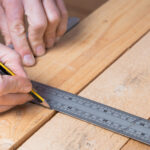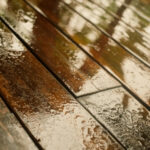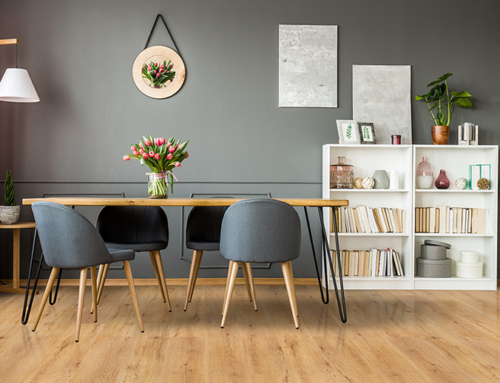When it comes to engineered hardwood flooring in Atlanta, the veneer — the thin layer of real hardwood on top of the construction — plays a crucial role in both the floor’s aesthetics and its performance over time. In this comprehensive guide, we will explore why the veneer is an essential aspect to consider when selecting engineered hardwood flooring, covering durability, refinishing potential, aesthetics, and value.
The Importance of Veneer in Engineered Hardwood Flooring
Engineered hardwood flooring offers a beautiful and practical alternative to solid hardwood floors, with enhanced stability and resistance to moisture. At the heart of its appeal is the veneer, a thin slice of real wood that provides the look and feel of traditional hardwood. This layer is what you see and walk on, making it a critical component for both the appearance and longevity of the flooring.
Durability and Lifespan
The thickness of the veneer layer directly impacts the floor’s durability and lifespan. Thicker veneers can better withstand wear and tear, offering a longer lifespan for your flooring. They’re more resistant to deep scratches and gouges, which can penetrate thinner veneers and reach the core layers, potentially causing damage that’s difficult to repair.
Refinishing and Renewal
One of the significant advantages of engineered hardwood flooring with a thicker veneer is the ability to sand and refinish the surface, much like solid hardwood flooring. This process can rejuvenate the floor, remove signs of wear, and even allow for a change in stain color, giving your space an entirely new look without the need for a full floor replacement. Thinner veneers may not support even a single refinishing, limiting the floor’s adaptability to future design changes.
Aesthetics and Authenticity
The veneer layer of engineered hardwood flooring is what gives it its beauty and authentic wood appearance. The quality, species, and cut of the wood veneer contribute to the floor’s overall look, including its grain patterns, color variations, and texture. Higher-quality veneers made from premium wood species can significantly enhance the luxurious feel and authenticity of the flooring, making it indistinguishable from solid hardwood.
Value and Cost Considerations
While engineered hardwood floors with thicker, high-quality veneers tend to be more expensive, they also offer better value in the long run. They’re more durable, have a longer lifespan, and can be refinished, potentially saving money on flooring replacements in the future. However, it’s also possible to find engineered floors with thinner veneers that offer a good balance of cost and quality, suitable for spaces with lower traffic or shorter renovation cycles.
Choosing the Right Veneer for Your Needs
When selecting engineered hardwood flooring, consider how the space will be used and your long-term plans for your home. High-traffic areas, homes with pets or children, or spaces where you plan to stay for many years may benefit from flooring with a thicker veneer. For less frequented areas, guest rooms, or short-term living situations, a thinner veneer might suffice, offering cost savings without sacrificing the aesthetic appeal of wood flooring.
Maintenance and Care
Regardless of the veneer thickness, proper maintenance is key to preserving the beauty and extending the life of engineered hardwood floors. Regular cleaning, using felt pads under furniture, and maintaining a stable indoor humidity level can help protect the veneer from scratches, dents, and warping.
Environmental and Health Considerations
When choosing your flooring, also consider the environmental impact and health implications. Look for products with certifications like the Forest Stewardship Council (FSC) for sustainable wood sourcing and the California Air Resources Board (CARB2) for low emissions of volatile organic compounds (VOCs), ensuring that your flooring choice is both beautiful and responsible.
Final Thoughts on “Vaneer Type/Thickness Matter on Engineered Hardwood Flooring in Atlanta”
The veneer of an engineered hardwood floor matters significantly, affecting everything from the floor’s durability and lifespan to its appearance and ability to be refinished. When choosing engineered hardwood flooring, consider the veneer’s thickness, species, and quality in relation to your budget, lifestyle, and aesthetic preferences. By making an informed decision, you can enjoy the beauty of hardwood flooring with the added benefits that engineered construction provides, ensuring a lasting and valuable addition to your home. If you need more help with engineered hardwood flooring, check out our Atlanta Store.
Author Profile
- I have worked in hardwood flooring for the last 8 years. Use to run a company of residential crews as well as a company with gym flooring. If you need floor installation or refinishing help, I should have an answer or at least get you in the right direction.
Latest entries
 FlooringJanuary 15, 2026Does New Hardwood Flooring Increase Your Home Value?
FlooringJanuary 15, 2026Does New Hardwood Flooring Increase Your Home Value? FlooringJanuary 14, 2026Can You Refinish Engineered Hardwood?
FlooringJanuary 14, 2026Can You Refinish Engineered Hardwood? FlooringJanuary 10, 2026What Wood Floor Color Do I Choose?
FlooringJanuary 10, 2026What Wood Floor Color Do I Choose? FlooringJanuary 9, 2026How To Prevent Hardwood Floor Moisture Problems?
FlooringJanuary 9, 2026How To Prevent Hardwood Floor Moisture Problems?


